Key takeaways:
- The Roe v. Wade decision in 1973 legalized abortion and significantly mobilized the pro-life movement, creating passionate advocates for the unborn.
- The emergence of the Silent No More Awareness Campaign in 2003 provided individuals a platform to share personal post-abortion experiences, highlighting the importance of personal narratives in the pro-life debate.
- The March for Life has grown into an annual gathering, demonstrating the power of community and collective voices in advocating for pro-life beliefs.
- Historical movements, such as the suffragist movement, offer parallels and lessons for today’s pro-life advocacy, emphasizing the need for compassion and education in shaping societal beliefs.
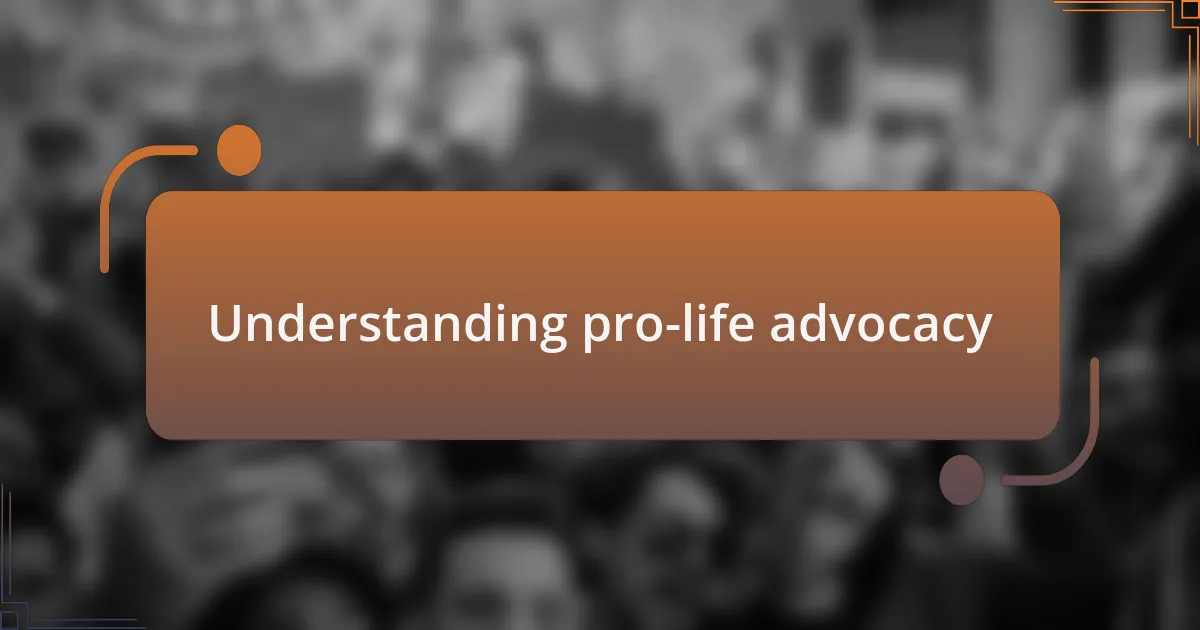
Understanding pro-life advocacy
Pro-life advocacy centers around the belief that every life, from conception onward, holds intrinsic value and deserves protection. I still vividly recall my first encounter with this perspective during a community event. I listened intently as a young mother shared her story about choosing life despite dire circumstances, and it sparked a profound change in how I viewed the issue.
In my experience, pro-life advocacy isn’t merely about opposing abortion; it’s a holistic approach that encompasses support for families and education on alternatives. I remember visiting a crisis pregnancy center and witnessing their dedicated team providing resources and emotional support. It was eye-opening to see how compassion and outreach can create life-affirming choices. Have you ever considered how much impact these personal stories can have in the broader debate?
Understanding pro-life advocacy also involves recognizing the ethical dimensions at play. I find myself often contemplating the moral implications of choice and life. As I reflect on the different narratives surrounding this topic, I realize that each story adds depth to the discussion, reminding us that it’s not just about policy but about real lives and the complex decisions they face.
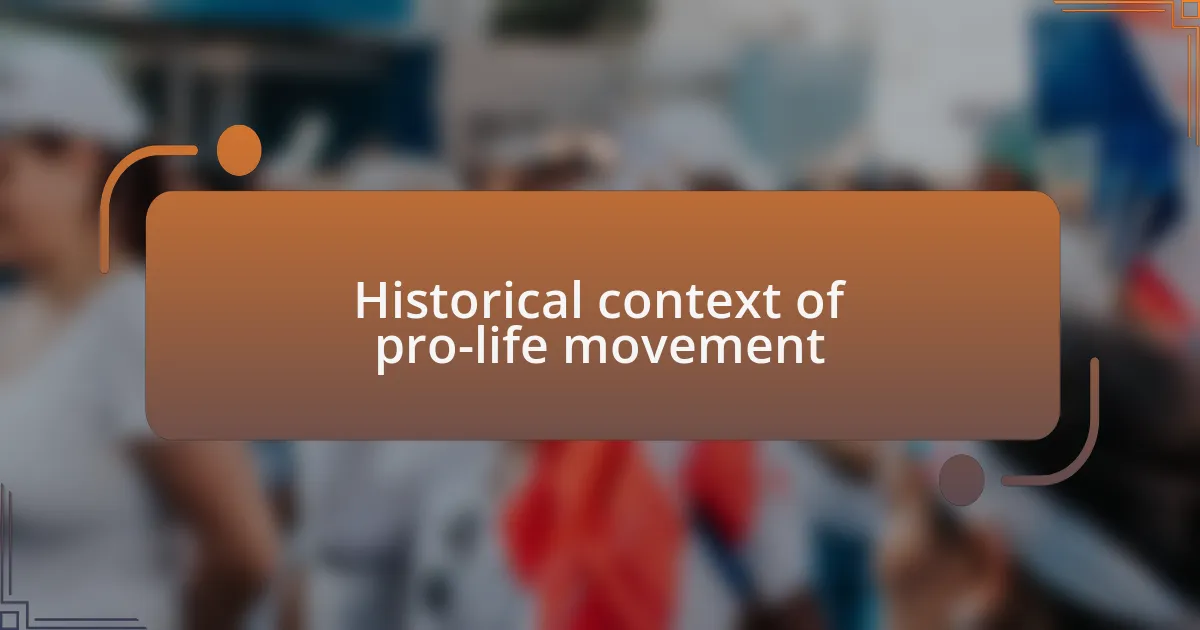
Historical context of pro-life movement
The pro-life movement’s roots can be traced back to the early 20th century, with various religious and philosophical influences advocating against abortion. I recall diving into books about figures like Dr. Bernard Nathanson, a former abortionist who became a stark pro-life advocate after witnessing the consequences of his actions. His transformation underscores how awareness can lead to significant shifts in belief and practice on this vital issue.
In the 1960s, as societal attitudes began shifting, the movement gained momentum—especially with the landmark Roe v. Wade decision in 1973. It drew a line in the sand, compelling many to rally around the idea that life should have legal protection from conception. Thinking back to discussions I had with friends during college, I realized how divided opinions often were, which made me ponder why so many were unaware of the history and implications behind this pivotal ruling.
Moving into the 1980s and 1990s, the pro-life movement became more organized, utilizing rallies, educational programs, and advocacy at various levels. I remember attending a local pro-life march, surrounded by passionate individuals holding signs and sharing stories, all united by a common cause. It struck me then how history shapes our present views and actions—each generation confronting the ongoing debate in the light of past experiences and progress. Have you ever reflected on how those historical events might influence your own perspectives today?
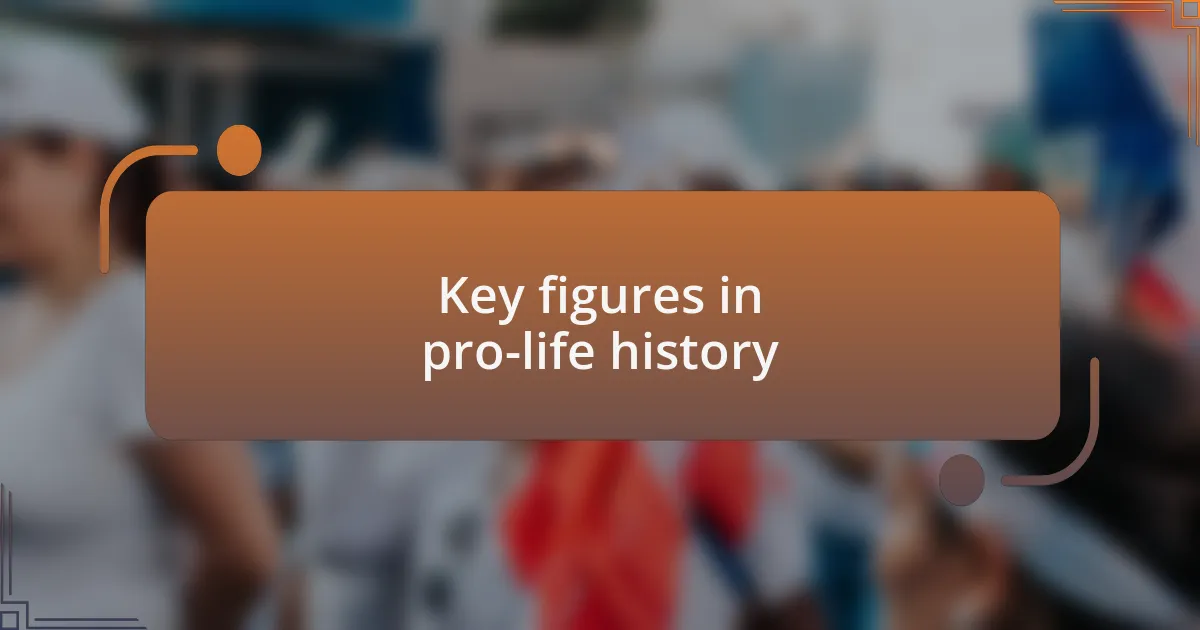
Key figures in pro-life history
The pro-life movement has been shaped by several pivotal figures, one of whom is Father Paul Marx. His founding of the organization Human Life International in 1981 was a significant catalyst in spreading pro-life beliefs globally. I often think about how grassroots efforts can start from a single vision—Father Marx’s passion for life inspired many to advocate for the unborn, making it a truly communal effort.
Another important figure is Norma McCorvey, famously known as “Jane Roe” in the Roe v. Wade case. Strikingly, she later became a pro-life activist, illustrating the complex journey of belief transformation. In my experience, hearing about her personal conflicts often makes me reflect on the deeper stories behind legal battles—what drives someone to walk away from such a pivotal role in abortion rights?
Then there’s Dr. Alveda King, niece of Martin Luther King Jr., who has used her platform to bring attention to the impact of abortion on African American communities. Her work not only amplifies the pro-life message but also highlights the intersection of civil rights and the right to life. I find her perspective incredibly powerful; it challenges me to think about the broader implications of our beliefs and the responsibility we have to advocate for all lives.
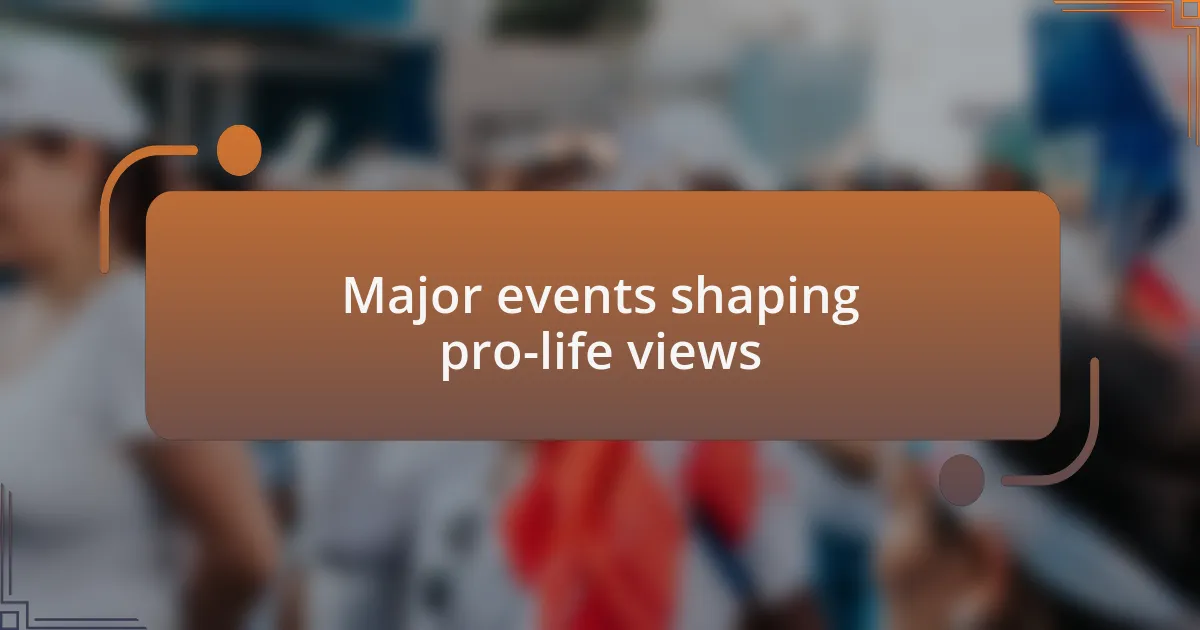
Major events shaping pro-life views
Throughout history, major events have indelibly shaped pro-life perspectives, with one of the most critical moments being the 1973 Supreme Court decision in Roe v. Wade. This landmark ruling not only legalized abortion across the United States but also sparked a passionate response from the pro-life community. I often wonder how such a decision can polarize viewpoints so sharply—it’s as if it gave birth to a new wave of activism, galvanizing individuals and organizations to advocate fervently for the unborn.
Another pivotal event was the emergence of the Silent No More Awareness Campaign in 2003, which created a platform for individuals to share their post-abortion experiences. Hearing these deeply personal stories can be heartbreaking yet enlightening. It reminds me how vital it is for us to listen to those affected by abortion, as their narratives offer insights we must integrate into our advocacy. They serve as a poignant call to reflect on how our actions today will be remembered in the future.
More recently, the March for Life has become an annual event, drawing thousands to rally for the pro-life cause. Attending this demonstration was a transformative experience for me; seeing so many passionate individuals united for a common moral belief reminded me of the strength found in community. It raises the question—can one person’s voice truly make a difference? Standing among likeminded advocates made it clear that collective voices are powerful catalysts for change.
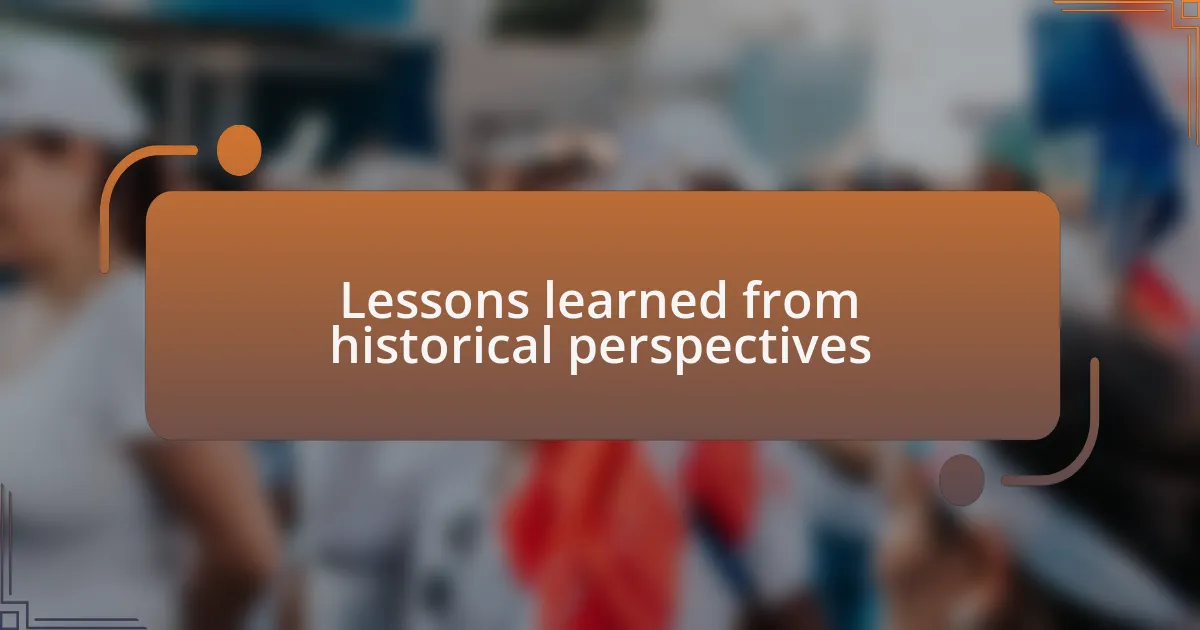
Lessons learned from historical perspectives
It’s fascinating how historical perspectives illuminate our understanding of the pro-life movement. For instance, reflecting on the early 20th-century suffragist movement, I realize that women’s voices advocating for life were often intertwined with their fight for rights. It makes me ponder—what parallels can we draw between those battles for equality and our current fight for the unborn? It’s a reminder that progress often requires the courage to confront societal norms.
The stories from the 1980s’ anti-abortion activists resonate deeply with me as well. When I learned about the compassion shown by those who volunteered at pregnancy centers, I felt a wave of determination wash over me. Their refusal to ignore the plight of vulnerable mothers and children taught me the importance of meeting people where they are, something I strive to incorporate into my advocacy today. Isn’t it intriguing how acts of kindness can inspire movements?
Moreover, examining the rise of the global pro-life movement has expanded my worldview. I’ve watched as organizations in various countries rally to safeguard life, demonstrating that this cause knows no borders. It challenges me to think: how can we learn from these international efforts to strengthen our own? Their successes and challenges often reflect the complexities of our mission, reminding me that advocacy is a shared journey, requiring collaboration and learning from one another.
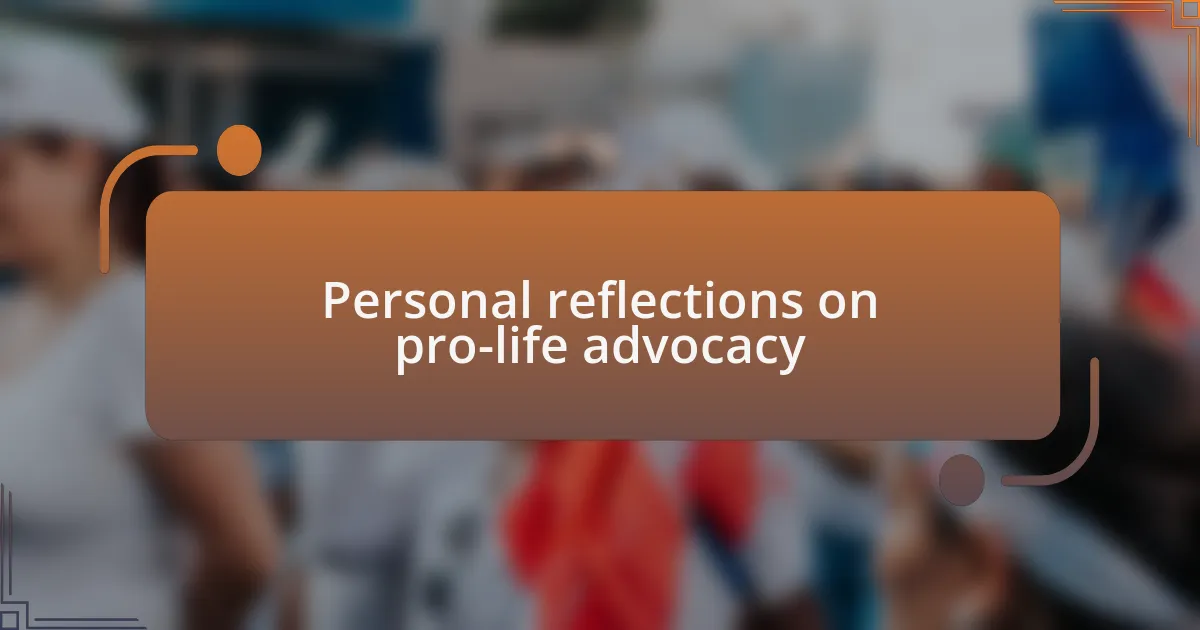
Personal reflections on pro-life advocacy
Personal reflections on pro-life advocacy
When I think about my own journey in pro-life advocacy, I can’t help but recall the moment I attended my first rally. The energy was electric, and standing shoulder to shoulder with like-minded individuals reignited my passion for the cause. It was a vivid reminder that advocacy is not just about fighting for ideals; it’s about creating a community of support and hope.
I often reflect on conversations I’ve had with individuals who come from diverse backgrounds and beliefs. One encounter that stands out is with a young mother who faced an unplanned pregnancy. Hearing her story of fear transformed into hope through support made me realize the profound impact of empathy in my advocacy efforts. How often do we pause to listen to those directly affected by these issues?
Additionally, volunteering at a local pregnancy center has reshaped my understanding of what it means to advocate for life. Witnessing the resilience of women and the joy of their children’s births has been profoundly moving. It raises the question: how can we ensure that every mother receives the love and support she deserves? Each experience strengthens my resolve to be part of the solution, reminding me that advocacy is a personal commitment to nurturing life in all its forms.
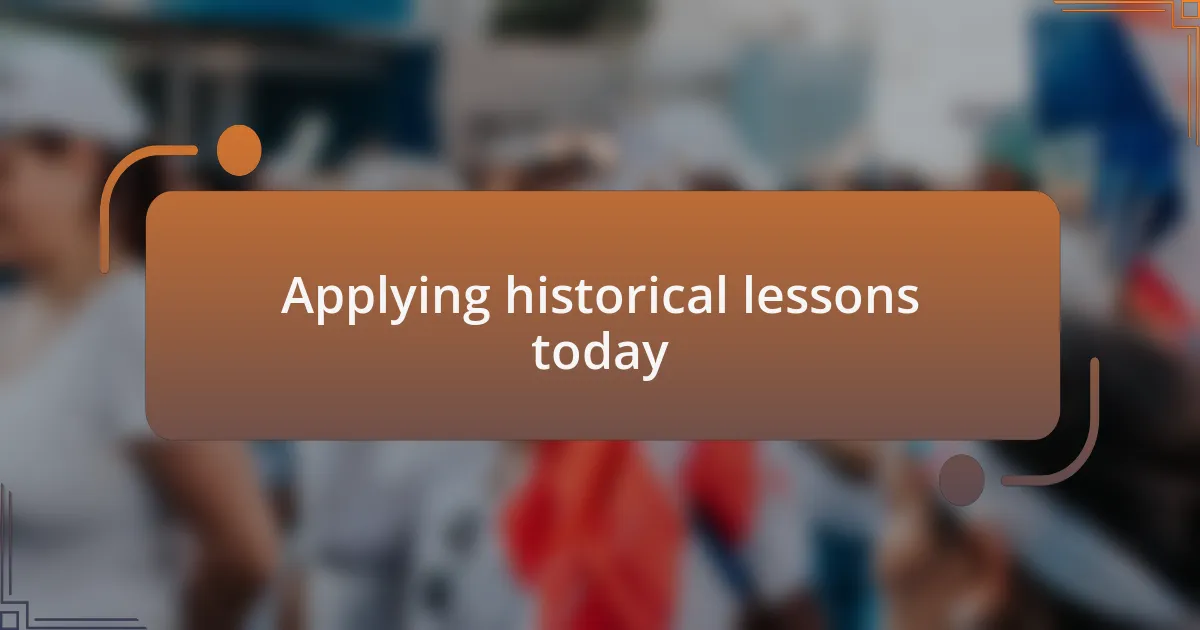
Applying historical lessons today
Throughout history, we’ve seen how the tenacity of advocates has shaped societal beliefs and policy. For instance, during the civil rights movement, committed individuals rallied together, demanding dignity and equality. I often think about how those lessons can be applied to our own pro-life advocacy—how can we harness that same collective energy to foster a culture that values life at all stages?
When I consider the successes of past movements, I’m inspired by the importance of storytelling. I recall a presentation by an abortion survivor who shared her journey of overcoming adversity to embrace life fully. It struck me that personal narratives can be powerful tools in advocacy. How do we ensure that every story gets the attention it deserves, fostering understanding and compassion in our communities?
Another historical lesson I reflect on is the role of education in advocacy efforts. Just as previous generations fought misinformation with education, we too must prioritize knowledge-sharing to shape perceptions about life. I often ask myself, what resources can we develop to empower those grappling with difficult choices, ensuring they have access to accurate information and the support they need? Each step we take in this direction not only honors past advocates but reinforces our commitment to protecting life today.